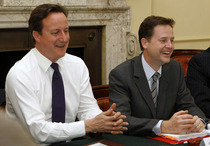 The electoral reform bill has passed comfortably, by 328 votes to 269. Now comes the
hard bit: this bill is going to be deservedly lacerated in committee. The bill drew opprobrium from all sides of the house throughout this afternoon’s long debate, notably from both wings of
the Tory party. First, the government has coupled boundary reform to the alternative vote referendum. Peter Hain, Labour’s most articulate attack dog, unleashed his thesaurus and referred to
the bill as a ‘smoke-screen for colossal gerrymandering’. He was speaking for his ardently hypocritical and opportunistic party. The government’s motives were not so
cynical; it coupled the bill’s two aims to aid swift progress through the commons. The result is a truly dreadful piece of legislation.
The electoral reform bill has passed comfortably, by 328 votes to 269. Now comes the
hard bit: this bill is going to be deservedly lacerated in committee. The bill drew opprobrium from all sides of the house throughout this afternoon’s long debate, notably from both wings of
the Tory party. First, the government has coupled boundary reform to the alternative vote referendum. Peter Hain, Labour’s most articulate attack dog, unleashed his thesaurus and referred to
the bill as a ‘smoke-screen for colossal gerrymandering’. He was speaking for his ardently hypocritical and opportunistic party. The government’s motives were not so
cynical; it coupled the bill’s two aims to aid swift progress through the commons. The result is a truly dreadful piece of legislation.
Equality of representation is admirable but an arbitrary numerical determination will exacerbate political dislocation. Labour’s opposition is well rehearsed; Conservative objections are less well known. Simon Hart, Tory MP for West Carmarthen and South Pembrokeshire and ostensibly on the party’s left, noted that his constituency would grow geographically. It currently takes an hour and a half to drive across it; constituents can expect to do it in two hours in future. Hart’s scenario will be reciprocated across Tory dominated rural England and Wales. It bodes badly for attendance at MPs’ surgeries and turnout, as well as Conservative chances at general elections.
Besides, some seats will be more equal than others. Voters on the Isle of Wight, 35,000 of whom will be represented by an MP who resides on the other side of the Solent. Exceptions are being made for Liberal Democrat held Orkney and Shetland and the Western Isles. In the pursuit of fairness, politics has trumped principle. Cameron and Clegg have vowed that the AV referendum is supposed to be non-partisan and neither will campaign – the mantra is that the people will decide. However, the referendum falls on the 5th May 2011, the day of intensely party political elections to local and devolved government across the UK. It cannot be anything other than a party political issue and therefore should be held on a different day.
David Davis made several adroit interjections – arguing that AV protects abject politicians from the voters’ wrath, and that the proposed changes to the boundary system are a central imposition that remove the power of local appeals against unfair or impractical changes.
There is a kernel of a good principle at the heart of Clegg’s Constitutional and Electoral Reform bill; the practice by which it is being introduced needs urgent revision.






Comments